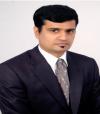Brief Answer:
Hearing loss is always multifactorial
Detailed Answer:
hello and welcome to health care magic,
I am Dr Sriram Nathan, an ENT surgeon and Let me complement you in being so involved and having a good understanding on the problem facing your grandchild.
You are right in assuming that hearing loss is multifactorial. In fact in any case of hearing loss, although the insult may be one or two, the factors causing the hearing loss may be many.
A Bony dehiscence of the superior semicircular canals can cause hearing loss even in adults along with
vertigo and in fact can also explain the initial findings as seen in your grand child such as the
conductive hearing loss and also the OAE results.
In many cases a mild conductive hearing loss can lead to severe hearing loss which might even happened in your grand child. In addition to the genetic factor which could have accelerated the process of course.
Now you must also understand that this is just a possibility, no one can concretely say that this is what happened.
Everyone reacts to situations in their own different way and there is no maths in human body.
Even a
mutation even if it present in no way means that the person will be affected by a problem. This is what we call the
genotype and phenotype which essentially means that though if you have a mutation there is a risk, it is not necessary that you will develop the problem associated with the mutation.
The development of problem associated with the mutation depends on several factors which are the interplay between the agent (mutation), host (our body) and environment (both internal and external). Hope what I am trying to explain is clear to you a little.
What I am further trying to explain is that the Bony dehiscence of the superior semicircular canals could have played a role in the present situation of your grand child but no one can be sure of the exact role and the extent of the same.
In addition to this since you have diagnosed this condition you must also consider these:
1. The dehiscence may cause vertigo or further problems in the future so you must have a follow up with scans every year and manage whenever necessary
2. In your grandchild's situation I would advice you to reconsider taking up cochlear
implantation which is the best bet for her recovery of hearing loss and also for her future language development.
3. If the hearing does not get better you must know that the language also will not develop so you must always make sure she gets the best in
aids and always wear them so that the at least some language development can be salvaged
4. The investigation for cause may turn out to be an exercise in futility but it is important for proper treatment and also to prevent such mishaps in future.
Hope this has shed some light in your plight and If you have any more doubts you can always get back to me
regards
Dr Sriram Nathan






